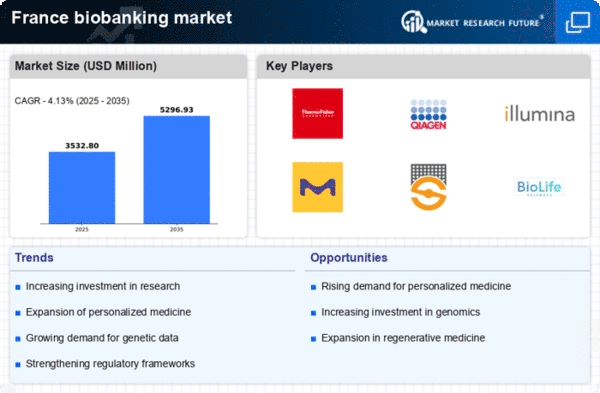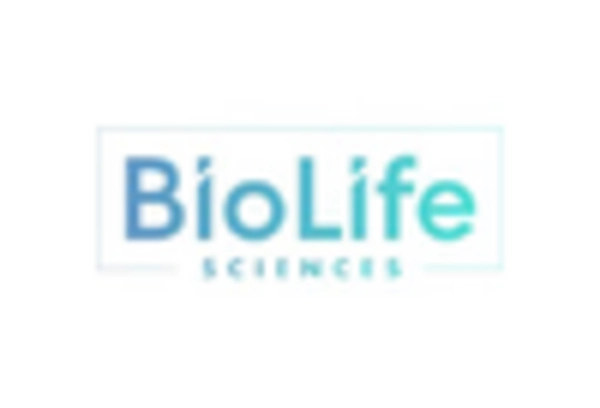Supportive Regulatory Framework
The regulatory environment in France is becoming increasingly supportive of biobanking initiatives, which is a key driver for the biobanking market. Government policies are evolving to facilitate the establishment and operation of biobanks, ensuring compliance with ethical standards while promoting research. This supportive framework is likely to attract more investments into the sector, as stakeholders feel more secure in their operations. In 2025, it is anticipated that regulatory support will contribute to a market growth of approximately 8%, as biobanks align with national health priorities and research agendas.
Advancements in Biobanking Technologies
Technological innovations are significantly impacting the biobanking market in France. The development of automated sample processing and advanced storage solutions enhances the efficiency and reliability of biobanks. For instance, the implementation of cryopreservation techniques allows for the long-term storage of biological samples without compromising their integrity. This is crucial for research institutions and pharmaceutical companies that rely on high-quality samples for their studies. As of 2025, the market is expected to witness a growth rate of around 10% annually, driven by these technological advancements that improve operational capabilities within biobanks.
Rising Demand for Personalized Healthcare
The increasing emphasis on personalized healthcare is driving the biobanking market in France. As healthcare evolves, there is a growing need for tailored treatments based on individual genetic profiles. This trend is reflected in the rising investments in biobanks, which are essential for collecting and storing biological samples for research. In 2025, the biobanking market in France is projected to reach approximately €500 million, indicating a robust growth trajectory. The integration of biobanking with genomic research enhances the potential for breakthroughs in disease prevention and treatment, thereby attracting more stakeholders to invest in this sector.
Increased Public Awareness and Participation
Public awareness regarding the importance of biobanking is on the rise in France, which is positively influencing the biobanking market. Educational campaigns and community outreach programs are encouraging individuals to donate biological samples for research purposes. This heightened awareness is crucial for expanding the sample repositories that biobanks rely on. As more individuals understand the role of biobanks in advancing medical research, participation rates are likely to increase, thereby enhancing the overall capacity of the biobanking market. This trend could lead to a more diverse and comprehensive collection of samples, which is essential for effective research outcomes.
Collaboration Between Research Institutions and Biobanks
Collaborative efforts between research institutions and biobanks are fostering innovation within the biobanking market in France. These partnerships enable the sharing of resources, expertise, and data, which enhances the quality and scope of research. By pooling resources, biobanks can expand their sample collections and improve their research capabilities. This collaboration is expected to drive market growth, with projections indicating a potential increase of 12% in the coming years. Such synergies not only enhance the operational efficiency of biobanks but also contribute to the advancement of scientific knowledge and public health outcomes.
















